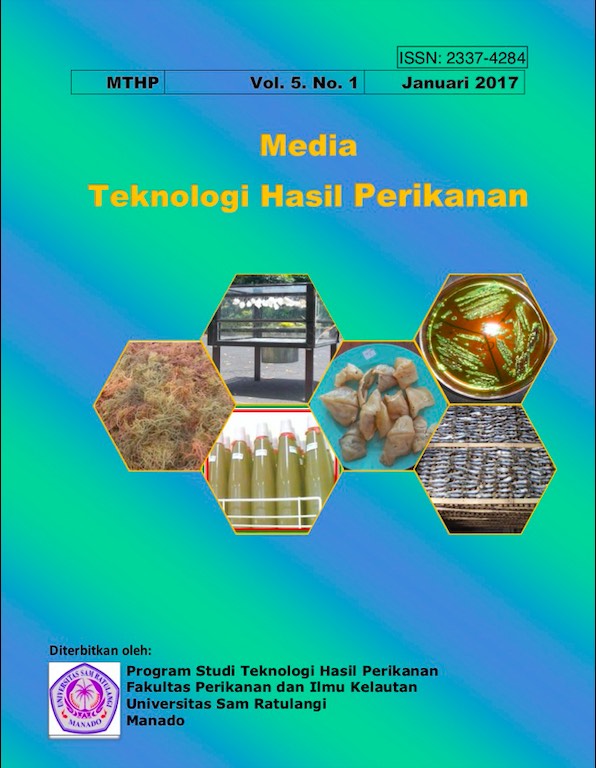MUTU IKAN CAKALANG (Katsuwonus pelamis L) ASAP YANG DIRENDAM DENGAN LARUTAN KULIT BUAH MANGGIS (Gracinia mangostana Linn).
DOI:
https://doi.org/10.35800/mthp.5.1.2017.14908Keywords:
Skipjack (Katsuwonus pelamis L), Mangosteen Fruit Leather (Gracinia mangostanan Linn)Abstract
The purpose of this study was to determine the quality of smoked skipjack (Katsuwonus pelamis L) smoke pre-treated in a solution of mangosteen peel with a concentration of 3, 4 and 5%, with various soaking time, then stored and observed at 0, 3, 6, and 9 days. The results showed that the highest value of total plate count (TPC) was found in the fish sample storage for 9 days, soaking with a concentration of 3% for 30 minutes. Meanwhile, the lowest TPC value was discovered for the fish samples that did not undergo storage, and immersed in a solution of 5% for 30 minutes. Furthermore, the highest TVB value (Total Volatile bases) was detected in fish samples soaked with 3% solution of the mangosteen for 15 minutes (59.22mg N/100g) while the lowest value obtained on the fish sample marinated with 5% concentration for 15 minutes and did not experience storage (5.04mg N/100g).
Downloads
Published
How to Cite
Issue
Section
License
Authors who publish with this journal agree to the following terms:
- Authors retain copyright and grant the journal right of first publication with the work simultaneously licensed under a Creative Commons Attribution License that allows others to share the work with an acknowledgement of the work's authorship and initial publication in this journal.
- Authors are able to enter into separate, additional contractual arrangements for the non-exclusive distribution of the journal's published version of the work (e.g., post it to an institutional repository or publish it in a book), with an acknowledgement of its initial publication in this journal.
- Authors are permitted and encouraged to post their work online (e.g., in institutional repositories or on their website) prior to and during the submission process, as it can lead to productive exchanges, as well as earlier and greater citation of published work (See The Effect of Open Access).






